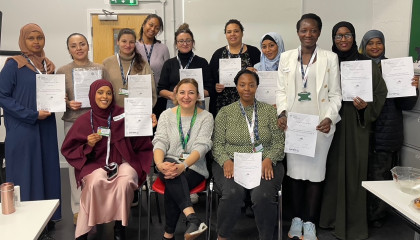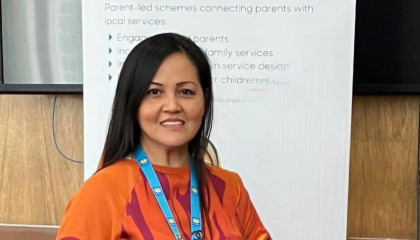You are here: News Concern for the inequality gap has increased as children from ethnic minority and disadvantaged backgrounds missed out on “considerably more” early years educat
New research on the impact of the COVID pandemic on Early Childhood Education and Care (ECEC) has revealed that “considerably more” children from ethnic minority and disadvantaged backgrounds have missed out on formal early learning.
Implications of COVID for Early Childhood Education and Care in England, a study funded by the Nuffield Foundation, and carried out by the Centre for Evidence and Implementation, the University of East London, Frontier Economics, Coram Family and Childcare and the Institute for Fiscal Studies, found that the number of children attending ECEC in the autumn 2021 had dropped to 90% of expected levels based on pre-pandemic patterns. The latest local authority figures continues to shows substantial variation in attendance rates.
Attendance was lower than expected in areas with large ethnic minority populations, deprived areas, and areas with high unemployment rates. Conversely, attendance rates were higher in LAs that were less deprived, had higher rates of development amongst two- and five-year-olds and had higher rates of female economic activity and lower unemployment rates.
The uptake of funded entitlement places amongst disadvantaged two-year-olds plummeted 7 percentage points (from 69% to 62%). Of the disadvantaged two-year-olds who dropped out of ECEC between January 2020 and January 2021, ethnic minorities and children with special educational needs were the most likely to have done so.
Detailed qualitative interviews with parents, providers and LA early years teams reveal the stark implications of children missing out on vital early learning. Speech and language delays were reported across all age groups; children’s physical development and motor skills were negatively impacted; and children struggled to adapt to new situations and develop self-regulation resulting in increased social, emotional and mental health needs. There was also widespread concern among early years practitioners that the development gap is widening and that the drop in participation of disadvantaged children may now become permanent.
Parents and carers reported the enormous challenge of caring for their children with little or no support from early years services. Mothers in particular felt the strain, some of whom were forced to take unpaid leave or reduce their working hours, and many saw their mental health negatively impacted.
The research also highlighted the impact of the pandemic on the financial sustainability of childcare providers, with many dipping into their reserves or taking on loans to continue to prioritise the needs of local families. The sector faces a web of complex challenges including reduced profits, uncertainty over levels of take-up as demand for flexible provision increases, and an unprecedented staff recruitment and retention crisis. The precarious financial position of providers was also found to have serious implications for children with complex needs as settings struggled to support them as some providers’ decisions were increasingly shaped by financial considerations and led to a prioritisation of children who generate more income and less likely to offer places to children with complex needs.
Ivana LaValle, Principal Investigator, said:
“The pandemic has highlighted the pivotal role of early education in children’s social, emotional and cognitive development. But children from disadvantaged and ethnic minority backgrounds, who are most likely to benefit from formal early learning, are also the children most likely to miss out. The inequality gap has widened, with a likely consequence being that the attainment gap also widens. If this trend is to be reversed, there needs to be more funding from Government to ensure that disadvantaged children have equity of access to quality early years education, including new statutory responsibilities and funding for local authorities to ensure high quality and accessible childcare provision is a key component of the local offer to families with young children – across the country.”
Eleanor Ireland, Education Programme Head, at the Nuffield Foundation, said:
"The COVID-19 pandemic has had a marked effect on young children's development, in part because many children did not attend early childhood education and care settings. However, even before the pandemic, the sector was experiencing issues in terms of quality, accessibility, affordability and sustainability. “We need a wholesale review of the purpose and provision of early childhood education and care, including how to improve access and outcomes for children from ethnic minority and disadvantaged backgrounds. Such a review also needs to consider the fairest and most sustainable funding model and how the people providing care can be appropriately skilled and remunerated.”
Notes to Editor
The study has been funded by the Nuffield Foundation, an independent charitable trust with a mission to advance social well-being. It funds research that informs social policy, primarily in Education, Welfare, and Justice. It also funds student programmes that provide opportunities for young people to develop skills in quantitative and scientific methods. The Nuffield Foundation is the founder and co-funder of the Nuffield Council on Bioethics, the Ada Lovelace Institute and the Nuffield Family Justice Observatory. The Foundation has funded this project, but the views expressed are those of the authors and not necessarily of the Foundation. Visit www.nuffieldfoundation.org.
For further information, a copy of the report and to arrange interviews please contact: Cheryl Gallagher, Media Officer at Coram: Cheryl.gallagher@coram.org.uk / 07515 411515.
About Coram Family and Childcare
Coram Family and Childcare works to make the UK a better place for families by bringing together what we learn from our on the ground parent-led programmes and our research to campaign for solutions that parents want and need. We focus on childcare and early years to make a difference to children’s lives now and in the long term.
For more information, please visit:
Website: coramfamilyandchildcare.org
Twitter: @CoramFamChild
Facebook: @famchildtrust
About Coram
Coram is the UK’s oldest children’s charity, supporting children to have the best possible chance in life since 1739. We work as a group of specialist organisations helping more than a million children, young people, families and professionals every year.
We support children and young people from their earliest days to independence, creating a change that lasts a lifetime. We help build their confidence; we help them to develop skills; we uphold their rights, we support practitioners in the areas of fostering and adoption and we find loving adoptive families for the most vulnerable children.
We work in over 2,000 schools supporting nearly half a million children, deliver outstanding adoption services and provide free legal advice for thousands of children and families who need it every year.
For more information, please visit:
Website: www.coram.org.uk
Twitter: @Coram
Facebook: Coramsince1739 Instagram: coram.uk
CEI
The Centre for Evidence and Implementation (CEI) is a global, not-for-profit evidence intermediary dedicated to using the best evidence in practice and policy to improve the lives of children, families, and communities facing adversity. Established in Australia in late 2015, CEI is a multi-disciplinary team across four offices in Singapore, Melbourne, Sydney, and London. We work with our clients, including policymakers, governments, practitioners, program providers, organization leaders, philanthropists, and funders in three key areas of work:
· Understand the evidence base.
· Develop methods and processes to put the evidence into practice.
· Trial, test and evaluate policies and programs to drive more effective decisions and deliver better outcomes.
Frontier Economics
Frontier Economics is one of the largest economic consultancies in Europe with offices in Berlin, Brussels, Cologne, Dublin, London, Madrid and Paris. Frontier uses cutting edge economics to solve complex business and policy problems and works with leading private and public sector organisations. The Public Policy Practice provides specialist economic and institutional knowledge across a range of areas including employment, education, childcare, health and social care. We work closely with clients from governments, public and voluntary sector bodies and businesses to properly understand the costs, benefits and impacts of policies to help identify the most effective approaches and create better policy.
The Institute for Fiscal Studies (IFS) is Britain’s leading independent microeconomic research institute. IFS publications are free to view on the IFS website (www.ifs.org.uk), where you can also find more information about its research, governance and funding. Please follow @TheIFS on Twitter for regular updates or contact the Press Office on 07730 667 013.
University of East London
The University of East London is a public university in the London Borough of Newham, London, England, based at three campuses in Stratford and Docklands, following the opening of University Square Stratford in September 2013. The university have been pioneering futures since 1898 and is a careers-led institution dedicated to supporting students to develop the skills, emotional intelligence and creativity needed to thrive in a constantly changing world.

Latest news
Meet Sarah - Best Newcomer!
19 May 2025
'It takes a village'
20 May 2025
How Parent Champions Islington reached families across the community





